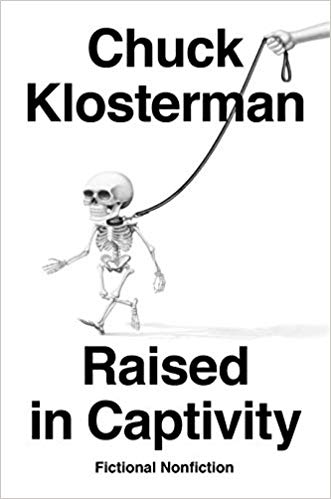Raised in Captivity – Chuck Klosterman

In his first collection of short stories, Klosterman presents fictional answers to implicit hypothetical scenarios. What would you do if you encountered a puma in an airplane lavatory? How do you communicate through an ad the quantum leap of a new product? Can someone get a little rabid from a rabies shot, and if so, how responsible are they for seeming menacing? What happens when the wrong kind of fans make a song you made popular though the fans seemed to have missed the point of the song? My questions are a bit too specific. Klosterman is interested in how technology and modernity have made us captive to specific kinds of expectations, perceptions, and experiences. The stories, at their best, alert us to our own chains. What’s shocking is that there’s really nothing in here I would classify as spiritual. Let’s say that one thing these stories are about is the way that we need fictional constructs to help us engage the truths of the world, that we would go blind if we looked directly into some of those truths without protective eye-wear. Then what’s the story in here about growing up Catholic or being a Christian or converting to Buddhism? I’m not saying it’s not here, but it seems like that kind of story should be here and it’s not.
The Ghost Map – Steven Johnson

This is gripping narrative of how two men, a doctor and a minister, helped solve the cause of the cholera outbreak in 19th Century London. John Snow, a doctor, and Henry Whitehead, an Anglican clergyman, collaborated to disprove the miasma theory and locate the source of the deadly outbreak in the water Soho residents were drinking. Johnson’s portrait examines how and why certain kinds of scientific arguments persuade while others fail and how important the marketing of an argument is. For instance, Snow’s two maps of the outbreak were more compelling than any single piece of writing he or Whitehead released to the public. Along the way, Johnson delves into the benefits and vulnerabilities associated with densely populated urban spaces. Snow and Whitehead won a victory for human flourishing in the big city, but Johnson warns we must continue to learn from their example in the era of biological weapons. Johnson’s analysis is indebted to evolutionary theory, and the book’s few mentions of religion reduce it to superstition. Whitehead, Johnson makes it seem, helps solve the cholera plague in spite of, rather than because of, his religious beliefs. What Johnson fails to mention is that one of the reasons Johnson was such a good neighbor to those who were in need was precisely the very real religious convictions he held. What role do spiritual communities play in ensuring the flourishing of the densely populated urban spaces Johnson adores?
Why Liberalism Failed – Patrick Deneen

I’ve just read a couple of chapters, but this book is a really compelling argument that representative democracy—which claims to provide political liberty and human dignity—is the source of the very problems that ail it. I’ve only read the diagnosis yet, not the cure, but Deneen is challenging both conservative and liberal thinkers in this book by going after the greed of the free market, on the one hand, and the disregard for tradition and entrenched forms of community on the other.
